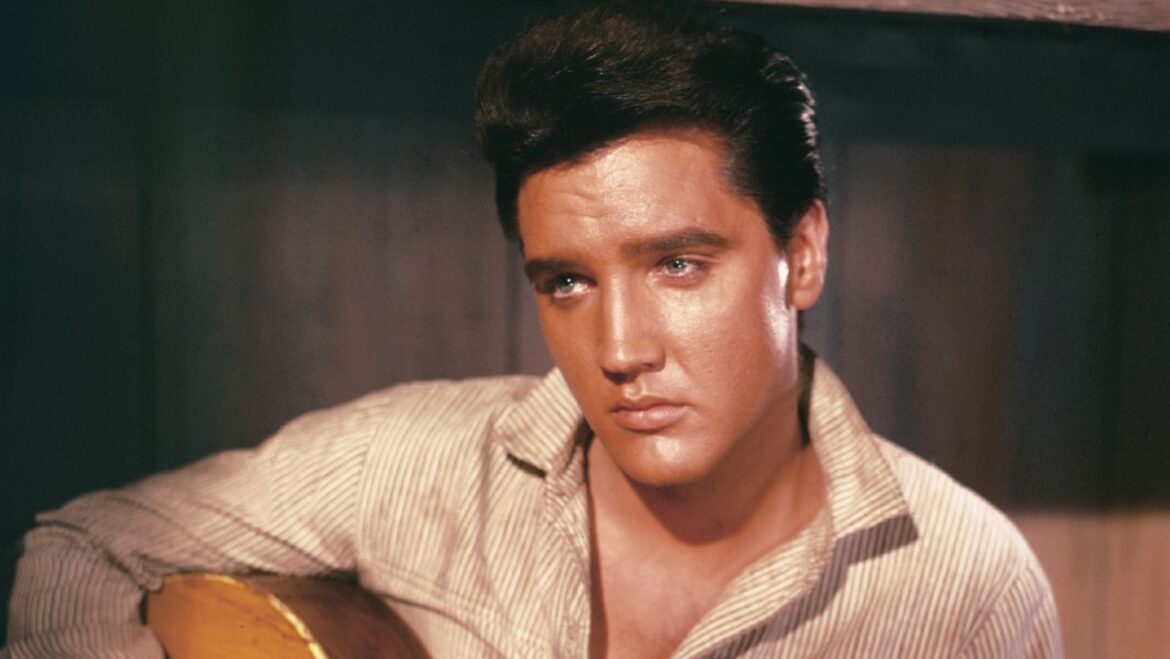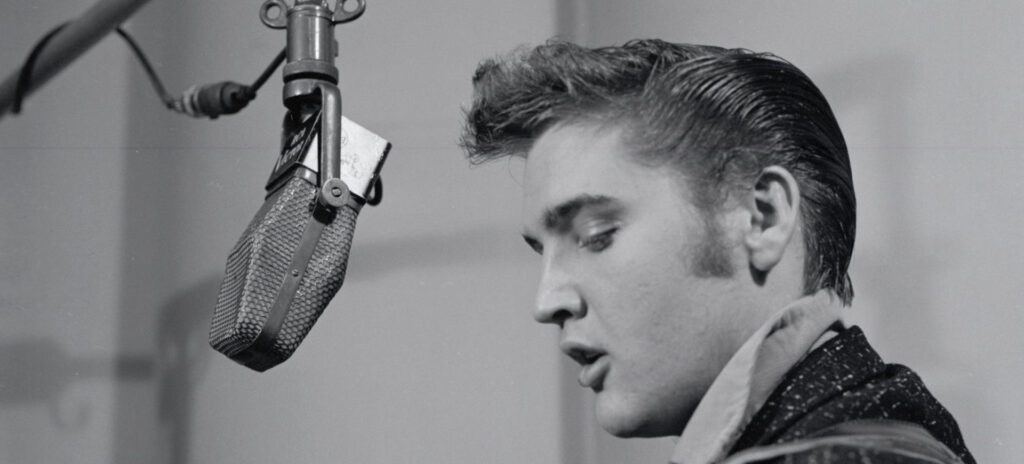
Elvis Presley, often referred to as the “King of Rock and Roll,” remains one of the most influential and celebrated figures in American music and pop culture. Born in Tupelo, Mississippi, on January 8, 1935, Presley rose from humble beginnings to become an international icon whose impact on music, fashion, film, and culture endures to this day. His life and career encapsulate the transformative power of rock and roll and the complex social and cultural changes that characterized America in the 20th century.
Early Life and Influences
Elvis Aaron Presley was born to Vernon and Gladys Presley in a two-room shotgun house in Tupelo, Mississippi. He grew up in a modest, working-class family, where economic hardships were common. His early years were marked by poverty, but his family was close-knit, and his mother Gladys, in particular, had a profound influence on his life. Gladys nurtured Elvis’s interest in music from a young age, and he grew up attending the Assemblies of God Church, where gospel music formed an essential part of his upbringing. The emotional and soulful gospel music of the Deep South deeply influenced Elvis, laying the foundation for his later musical style.
As he grew older, Presley was exposed to a variety of musical styles. The Mississippi Delta, where he spent his formative years, was a melting pot of musical influences, from gospel and blues to country and hillbilly music. Some of the most significant early influences on his music were African American artists such as B.B. King, Arthur Crudup, and Sister Rosetta Tharpe. Elvis admired their music and performances and integrated the rhythm, style, and emotion he encountered in their work into his own unique sound.
In 1948, the Presley family moved to Memphis, Tennessee, a city that was a hotbed of musical innovation. In Memphis, young Elvis was exposed to the burgeoning scene at Beale Street, where blues, R&B, and soul music flourished. The combination of gospel, country, and blues music he encountered in Memphis proved to be critical in shaping his musical identity.
Rise to Fame
Elvis Presley’s journey to stardom began when he walked into Sun Records in Memphis to record a song as a gift for his mother. Sam Phillips, the owner of Sun Records, took notice of Elvis’s unique sound and raw energy, which Phillips believed could appeal to both white and black audiences—a rarity at a time when racial segregation in the music industry was the norm. Phillips saw in Presley the opportunity to bring “black” music to a mainstream white audience.
In 1954, Elvis recorded his first single, “That’s All Right,” an up-tempo reworking of a blues song originally by Arthur Crudup. The song became a local hit, and his popularity grew rapidly. His early performances were marked by an uninhibited energy, charisma, and a distinctive style that included gyrating hips and dance moves. His stage presence was electrifying and, at times, controversial, as some deemed his movements too suggestive. This blend of talent and daring ignited a frenzy, especially among teenage audiences, who were drawn to his rebellious spirit and unique sound.
In 1955, Elvis Presley signed with RCA Records, marking the start of his national career. With hits like “Heartbreak Hotel,” “Hound Dog,” “Don’t Be Cruel,” and “Jailhouse Rock,” Elvis cemented his place in American pop culture. His appearance on television shows such as “The Ed Sullivan Show” and “The Milton Berle Show” reached millions of homes, further propelling his image and sound into the public eye. By the end of the 1950s, Elvis was not only a music star but a cultural icon whose influence extended beyond the music industry.
The Impact of Elvis on Music
Elvis Presley’s impact on music is monumental. He was instrumental in popularizing rock and roll and shaping its future. Before Elvis, rock and roll was a fringe genre, considered “race music” and not widely accepted by mainstream audiences. By blending blues, gospel, country, and R&B, Presley made rock and roll accessible to a broader, predominantly white audience. His crossover appeal played a crucial role in breaking down racial barriers in the music industry, challenging the segregation that had characterized American pop culture.
Presley also redefined the image of a rock star. His style, charisma, and persona became the blueprint for future generations of rock and roll musicians. He wore flashy outfits, adopted a unique hairstyle, and had an unmistakable voice. His music, performance style, and fashion sense influenced artists across multiple genres, from The Beatles and Bob Dylan to Bruce Springsteen and Michael Jackson. His ability to blend genres also set the stage for the genre-blending trends that continue in popular music today.
.

.
Beyond just music, Elvis Presley’s influence extended to fashion and personal expression. He popularized the sideburns, slicked-back hair, and flamboyant clothing that became synonymous with rock and roll. His look was both bold and distinct, challenging conventional norms of appearance and style. His influence on fashion and self-expression encouraged young people to embrace individuality and to experiment with their own sense of style.
Elvis in Hollywood
Elvis Presley’s success was not confined to music; he was also a prolific actor. In the late 1950s, Elvis began his foray into Hollywood. His first film, Love Me Tender (1956), was a box-office success and demonstrated his appeal on the silver screen. Throughout his career, Presley appeared in 31 feature films and two concert documentaries. His films, while not always critically acclaimed, were commercially successful and contributed significantly to his image as a multi-talented entertainer.
Movies like Jailhouse Rock and Viva Las Vegas were particularly popular, with musical numbers that became iconic in their own right. While his film career was often criticized for prioritizing formulaic scripts and commercial appeal over artistic quality, his movies allowed him to reach a global audience and further solidified his cultural status. However, many fans and critics believe that the heavy focus on Hollywood limited Presley’s musical growth and contributed to a decline in his creative output.
Military Service and Career Challenges
In 1958, at the peak of his fame, Elvis was drafted into the U.S. Army. His service, which lasted from 1958 to 1960, interrupted his career but also provided a new dimension to his public image. Rather than seeking special treatment, Elvis served as a regular soldier, which endeared him to the American public. His time in the Army introduced him to new experiences, including his encounter with Priscilla Beaulieu, who would later become his wife.
However, Elvis Presley’s return to the entertainment industry in the 1960s was met with challenges. The music landscape was changing, with new styles such as the British Invasion, led by The Beatles, capturing the attention of younger audiences. Elvis’s management and record label often steered him toward commercial ventures, including a series of formulaic films and accompanying soundtracks, which many critics argue stunted his musical evolution. Despite these setbacks, Elvis remained popular, though his music and image became more closely associated with nostalgia.
The Comeback Special and Las Vegas Era
In 1968, after several years of limited artistic output, Elvis Presley made a remarkable comeback with a televised concert known as the “’68 Comeback Special.” The show featured Elvis performing live in a small, intimate setting, showcasing his musical prowess and charisma. Dressed in a black leather suit, he delivered powerful renditions of his hits and reminded audiences of his rock and roll roots. The special revitalized his career, and Elvis subsequently began recording some of his most critically acclaimed work in years, including songs like “Suspicious Minds,” “In the Ghetto,” and “Kentucky Rain.”
.
.
Following the success of the ’68 Comeback Special, Presley began a series of live performances in Las Vegas, marking the start of a new phase in his career. His Las Vegas residency became iconic, and he continued to perform sold-out shows until the late 1970s. These performances cemented his status as a legend, though they also took a toll on his health and personal life.
Personal Struggles and Decline
Despite his professional success, Elvis’s personal life was fraught with difficulties. His marriage to Priscilla ended in 1973, a reflection of the increasing strain in his personal relationships. Additionally, the demands of his career, particularly his Las Vegas shows and the pressure to maintain his public image, led him down a path of substance abuse. He began to rely on prescription medications, which contributed to his declining health.
In the final years of his life, Elvis Presley’s physical and mental health deteriorated. His performances became increasingly erratic, and his once-vibrant energy diminished. On August 16, 1977, at the age of 42, Elvis Presley died at his home, Graceland, in Memphis.
Legacy and Cultural Impact
Elvis Presley’s influence on American culture and music is immeasurable. He is often credited with bringing rock and roll into the mainstream and for bridging the gap between racial divides in music. His impact extended beyond music to shape fashion, film, and the very notion of celebrity in the modern era. Elvis paved the way for generations of musicians who followed, influencing everyone from rock to pop artists.
Graceland, his Memphis home, has become a pilgrimage site for fans, and Elvis’s image and music continue to be celebrated worldwide. His enduring popularity is reflected in the posthumous success of his music, with countless re-releases, remixes, and tribute albums keeping his work alive for new audiences. Presley’s cultural legacy also includes his impact on gender and personal expression, as he challenged conventional norms and encouraged self-expression through style and music.
Conclusion
Elvis Presley was more than a musician; he was a cultural phenomenon whose influence on American music, culture, and society endures. His blend of gospel, country, and blues helped shape the sound of rock and roll, while his charismatic personality and distinctive style made him a beloved figure. Through his music, movies, and lasting legacy, Elvis Presley remains an indelible symbol of the power of rock and roll and the potential for music to transcend social and cultural barriers. His life, though marked by tragedy and challenges, left an enduring mark on the world, ensuring that the King of Rock and Roll’s spirit lives on.
Check out Elvis Presley on Amazon.
.


Pingback: The Killer Jerry Lee Lewis died October 28, 2022 - Dead Musicians
Pingback: Jerry Lee Lewis died October 28, 2022 - Dead Musicians
Pingback: Lisa Marie Presley sadly died January 12, 2023 - Dead Musicians
Pingback: Sonny Curtis died on September 19, 2025 - Dead Musicians
Pingback: Donna Jean Godchaux died November 2, 2025. - Dead Musicians
Pingback: The Man in Black, Johnny Cash died September 12, 2003 - Dead Musicians